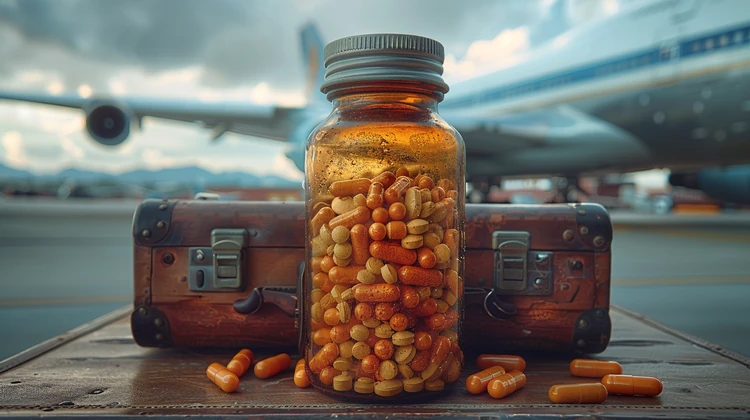Same with equipment like CPAP machines

Headed out for a summer vacation?Youre probablygoing to pack some of the medications you take in your bags, but did you know that in certain places, you might have to bring along some paperwork to prove youve got the right to possess those pills?
"Millions of passengers fly with prescription and OTC medications every year, but few people realize what's required for them to travel with meds or medical devices safely, AirAdvisors Joanna Teljeur told ConsumerAffairs.
Passengers traveling abroad need to be particularly diligent about carrying the correct documentation for their prescriptions and understanding which drugs aren't permitted or have restricted use in certain countries. Flying with medications goes way beyond remembering to pack them in your carry-on."
Packing right
Experienced travelers know that it's imperative to pack medications in your carry-on just in case your checked luggage is lost or delayed. In places like the U.S., Canada, the European Union (EU), and the United Kingdom, you can carry a whole pharmacy if you want in your hand luggage gels, liquids, and aerosols in "limited quantities," according to the TSA.
Unlike other liquids, medicines don't have to follow the 3-1-1 rule, but they should be in their original bottles.
To avoid any question marks, it would be smart to download your prescriptionlist from your MyChart account or get a note from your doctor explaining your medications.
That 3-1-1 rule breaks down like this depending on what country youre flying into:
United States: You can bring medically necessary gels, creams, and liquids in your carry-on, even if they exceed 3.4 ounces. These will be screened, so inform the TSA agents beforehand.
European Union: You can carry non-solid medicines in quantities over 100ml, packed in transparent plastic bags. Be prepared to prove the authenticity with documentation.
United Kingdom (Great Britain, Ireland, Wales, Scotland): Passengers need a prescription with their name or a medical statement for liquid, gel, or aerosol medications over 100ml.
Canada: Youre free to travel with non-prescription and prescription liquids, gels, and creams in quantities over 100ml, with relevant documentation from your doctor.
Another consideration is that not all meds are allowed in the cabin on commercial flights but must be stowed in checked bags. And Teljeur told ConsumerAffairs that while all medications are allowed in your hand baggage, some will require special documentation like a letter from your doctor and or pharmacy.
So, if you have prescriptions for narcotics, medical marajuana, liquid meds, or anything that requires refrigeration, keep everything in their original packaging and organize all the necessary paperwork so you have it with you to present to the TSA screeners," Teljeur said. "These substances aren't banned from cabin baggage, but they will certainly get more scrutiny.
Controlled drugs and medical weed
Controlled substances like opioids and narcotics have specific regulations and this is where things can get sticky.
United States: Always travel with a letter from your doctor or the original prescription, especially for narcotics or controlled substances.
United Kingdom: Controlled substances are not allowed without a license. A UK-based doctor or pharmacist must write a prescription upon arrival.
European Union (EU): Obtain a Schengen certificate for traveling with heavy painkillers, ADHD medication, sleeping pills, and anxiety drugs. These certificates are valid for 30 days and can be gotten at your doctors or possibly from a pharmacy.
Canada: Secure a doctors letter or valid prescription for controlled substances. You can travel with a single treatment supply, a 30- or 90-day supply for certain medications.
Then, we get to medical marijuana and the debate gets even more interesting. For example, in the U.S., you cannot take medical marijuana on flights, as it remains illegal under federal law. But, in Canada, you can fly domestically with cannabis, but not out of the country.
While certain places in the EU (Amsterdam, Germany, for example) turn their head if youre possessing marijuana, theres no umbrella policy that covers every single country. But just because you can legally buy someMaui Wowie in Amsterdam doesn't mean you can fly with itno matter where you go.
Prohibited meds
Even if your doc prescribes that you need to take, say, Adderall or Ambien, not every country is doing to let you bring it in. Here are a few examples:
Narcotics and Psychotropic Medications:
-
Adderall: This ADHD stimulant is banned in Japan. If youre caught with it, you could be arrested and detained. Other countries are picky about it, too: United Arab Emirates (UAE), Singapore, some Middle Eastern countries like Saudi Arabia and Kuwait, and several Southeast Asian countries like Thailand and Indonesia.
-
Ambien/Zolpidem: This sedative is banned in Singapore and requires a special license in the UAE.
-
Codeine: This painkiller is banned or restricted in many countries, including Greece, the UAE, and Egypt.
Over-the-Counter Medications:
-
Pseudoephedrine: Found in some cold and allergy medicines like Sudafed, it's restricted in many countries due to its potential use in illicit drug production.
-
Diphenhydramine: The active ingredient in Benadryl, it's regulated in some countries like Japan.
Before traveling to a country with any medication, you should check the embassy website of the country you are visiting or consult resources like AirAdvisor, the International Narcotics Control Board (INCB) and FitForTravel.
Photo Credit: Consumer Affairs News Department Images
Posted: 2024-07-03 12:35:10




















